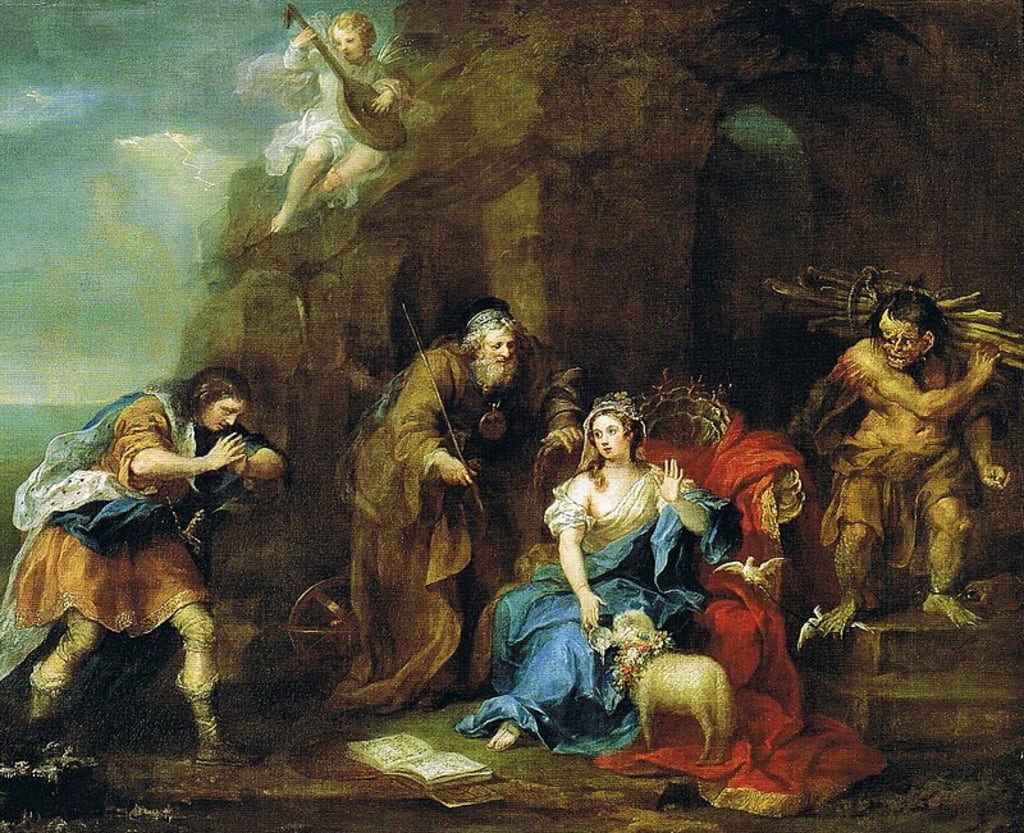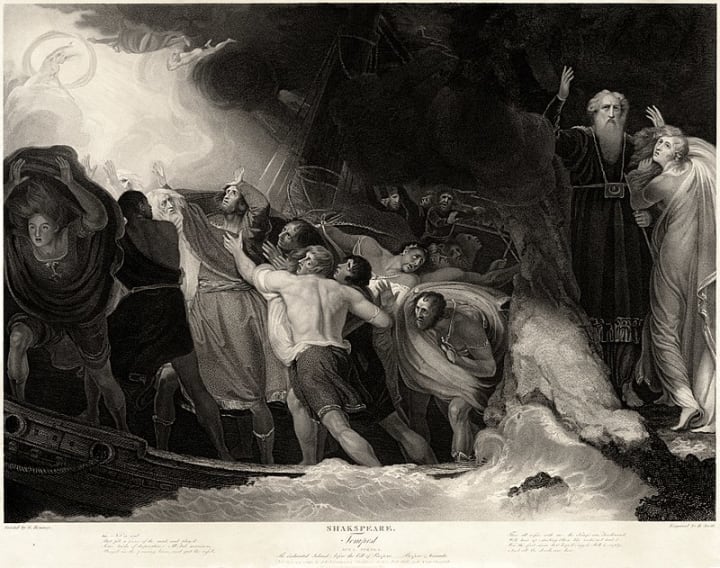William Shakespeare's The Tempest
By Doc Sherwood

At some point between 1585 and 1592, a young William Shakespeare left his hometown Stratford-upon-Avon to seek his fortune as a playwright. Nobody knows which of his works was the first to be written or performed - only that on an afternoon in London around the late 1580s or early 90s, a Shakespeare play appeared onstage for the first time. The world changed forevermore that day, which is long forgotten to us now.
By 1610 it must have seemed quite a while ago for Shakespeare too. He was approaching fifty years of age, the last plays of his famous tragic cycle were behind him, and he'd made enough money to live comfortably. Shakespeare in addition still had a wife, not to mention two surviving daughters who were young women by then. Although he'd been something of an absentee parent while his girls were growing up, he seems to have enjoyed closer relations with them later in life. We know from records of legal transactions that Shakespeare as of the early Seventeenth Century was spending more time back home in Stratford, with his daughters and their husbands.
In short, William Shakespeare was ready to retire from the theatres of London. From this period in his life emerged The Tempest, the last play he wrote on his own, which is widely regarded as Shakespeare's farewell to the stage.

The Tempest tells of an old magician named Prospero, who lives on a island in the Mediterranean with his beautiful daughter Miranda. Prospero once was the Duke of Milan, but was banished by his usurping brother Antonio in alliance with Alonso, the King of Naples. The island is full of magic, and was previously the home of Sycorax, a witch who was herself banished there from Algiers.
Sycorax’s slave was an elemental spirit named Ariel, who she imprisoned for refusing to carry out her wicked tasks. After Sycorax’s death, Prospero released Ariel, and promised him his freedom if he served him in his own cause. For Prospero has learned that his enemies Antonio and Alonso will soon be sailing past his island on their way home to Italy from Tunisia. Prospero sees this as his chance to take revenge, and at last reclaim his lost dukedom.
So, with his magic Prospero raises a terrible storm (hence the title of the play) and wrecks Alonso’s ship, harming no-one but washing the evil-doers ashore on the island. Ariel leads these castaways deeper and deeper into Prospero’s clutches, where punishment awaits. He also lures Alonso’s young son Ferdinand to Prospero himself, for the magician has plans for him to marry Miranda...if he proves himself worthy of her.

Prospero’s other servant is Caliban, the son of Sycorax. He is described as a monster, and Prospero claims his father was the Devil himself. Certainly there is a dark side to Caliban, who doesn't deny he attempted lustful trespasses against Miranda in the past. On the other hand, Prospero’s treatment of him can seem excessively cruel. The magician has enslaved him, despite the fact that Caliban was born on the island and might thereby qualify as its rightful ruler. In addition, Prospero uses his magic to violently chastise Caliban whenever he steps out of line.
Some scholars have argued Caliban's plight is suggestive of colonial practices, in which native peoples were enslaved and exploited. The Tempest has therefore become an important text for postcolonial theory, from the perspective of which Caliban is not a villain or monster, but a victim.
As the play proceeds, Caliban has an encounter with two survivors from the shipwreck while he is fetching firewood for Prospero. With his new friends (a sailor and a cook) Caliban plots to murder Prospero that the three of them may become kings of the island together. Bloodthirsty as this subplot sounds, it serves the ostensible purpose of comic relief only. Nevertheless, much consideration has been given to its depiction of workingmen and a oppressed native rising up against a patriarchal power-figure. It may be that in Shakespeare's final play, as in so many of the works that preceded it, we are invited to contemplate the higher social issues that may lie behind the comedy.

Meanwhile, Prospero continues to use his magic and Ariel’s strange powers against his enemies, while testing Ferdinand with hard manual labour to determine whether he deserves his daughter’s hand. At length, deciding he does, Prospero frees Ferdinand and gives him permission to marry Miranda. Meanwhile, Ariel reports that Antonio, Alonso and their followers are helpless in Prospero’s trap, and what follows is perhaps the play's pivotal moment.
Ariel tells Prospero his victims have so suffered “that if you now beheld them, your affections would become tender.”
When Prospero asks him if he really thinks so, Ariel's reply comes back:
“Mine would, Sir, were I human.”
All at once Prospero is forced to confront the realisation he must somehow have forgotten what it means to be human, if he has to learn it again from a creature that is not. Although capable of cruelty, he is not an evil man at heart. Prospero therefore resolves at last to show mercy, declaring “the rarer action is in virtue than in vengeance.”
Forgiving his old foes and pardoning Caliban for his attempted rebellion, the magician then breaks his magic staff and drowns his book of spells in the ocean, to return to the mainland with his daughter, her new fiancé Ferdinand, and the others. Prospero's last act is to set Ariel free, as he promised, although Caliban’s fate remains one of Shakespeare’s great unanswered questions. Then Prospero turns to address the audience, as The Tempest draws to its end...

Prospero’s closing speech has been read by many as a farewell from Shakespeare himself, in this, the last play he wrote alone. There are other passages from The Tempest too that suggest that Shakespeare is saying goodbye to his audiences and readers, including the famous speech that begins “Our revels are now ended,” in which Prospero informs us “we are such stuff as dreams are made upon.” It may be, however, that the very last word goes not to Prospero but Miranda. Looking out upon the new horizon suddenly before her now that she is leaving the only land she has ever known, and with all the treasures of the vast undiscovered world waiting for her, she exclaims...
"O wonder! How many goodly creatures are there here! How beauteous mankind is! O brave new world, that has such people in it!"
A new century had dawned, and Shakespeare will have already perceived that in some respects his time was passing. But how like him to see that every ending is itself a beginning. How like him to know when the time has come to hand the torch to a new generation. And how like him to remind us in parting that change, farewells, and even death itself, may themselves be the greatest adventures we can embark upon.
About the Creator
Reader insights
Outstanding
Excellent work. Looking forward to reading more!
Top insights
Compelling and original writing
Creative use of language & vocab
Easy to read and follow
Well-structured & engaging content
Excellent storytelling
Original narrative & well developed characters
Expert insights and opinions
Arguments were carefully researched and presented
On-point and relevant
Writing reflected the title & theme






Comments (2)
The beginning offers an interesting insights into the later life of William Shakespeare and the circumstances surrounding his retirement from the theater. It piques the reader's curiosity about the life and career of the renowned playwright. The language is evocative and creates a sense of historical distance, transporting the reader back to the early 17th century. Driving the reader to explore more.
'The Tempest' is one of the most dear to my heart. I feel so sad for Caliban. Colonialism and all of its evils. Really enjoyed your summary and interweaving analysis. Thank you! The ending lines always remind of 'full of sound and fury.' from Macbeth. Same sentiment I think.